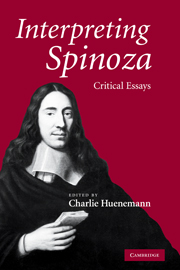Book contents
- Frontmatter
- Contents
- Notes on contributors
- Method of citation
- Introduction
- Chapter 1 Representation and consciousness in Spinoza's naturalistic theory of the imagination
- Chapter 2 Rationalism run amok: representation and the reality of emotions in Spinoza
- Chapter 3 “Whatever is, is in God”: substance and things in Spinoza's metaphysics
- Chapter 4 Necessitarianism in Spinoza and Leibniz
- Chapter 5 Epistemic autonomy in Spinoza
- Chapter 6 Spinoza and the philosophy of history
- Chapter 7 Democracy and the good life in Spinoza's philosophy
- Chapter 8 Spinoza's unstable politics of freedom
- Chapter 9 Should Spinoza have published his philosophy?
- Bibliography
- Index
Chapter 7 - Democracy and the good life in Spinoza's philosophy
Published online by Cambridge University Press: 22 September 2009
- Frontmatter
- Contents
- Notes on contributors
- Method of citation
- Introduction
- Chapter 1 Representation and consciousness in Spinoza's naturalistic theory of the imagination
- Chapter 2 Rationalism run amok: representation and the reality of emotions in Spinoza
- Chapter 3 “Whatever is, is in God”: substance and things in Spinoza's metaphysics
- Chapter 4 Necessitarianism in Spinoza and Leibniz
- Chapter 5 Epistemic autonomy in Spinoza
- Chapter 6 Spinoza and the philosophy of history
- Chapter 7 Democracy and the good life in Spinoza's philosophy
- Chapter 8 Spinoza's unstable politics of freedom
- Chapter 9 Should Spinoza have published his philosophy?
- Bibliography
- Index
Summary
One of the features of Spinoza's philosophy that makes it attractive to many twenty-first-century readers is its defence of democracy as the constitutional form of an ideal state. Although the Tractatus Politicus breaks off before spelling out the details of a democratic constitution, other texts encourage the reader to envisage a free way of life as most fully realizable in an inclusive polity, where subjects advance their understanding and liberty by following laws they have made themselves. The view that human beings have the potential to live most freely in democratic states is exceptional among seventeenth-century writers, and Spinoza is the best-known of a small group of Dutch authors who are justly celebrated for defending it. Focusing on this claim, a range of commentators of various ideological persuasions have hailed him as the initiator or inspiration of the modern democratic tradition. According to Jonathan Israel, for example, “Spinoza was the first major European thinker in modern times – though he is preceded here by Johan de la Court and Van den Enden – to embrace democratic republicanism as the highest and most fully rational form of political organisation, and the one best suited to the needs of men.”
This is indeed one way to read Spinoza and, as I shall argue, it draws on a central and inspiring strand of his thought. There are, however, other strands, perhaps less straightforwardly susceptible to celebration, but equally pertinent to an understanding of his assessment of democracy.
- Type
- Chapter
- Information
- Interpreting SpinozaCritical Essays, pp. 128 - 146Publisher: Cambridge University PressPrint publication year: 2008
- 5
- Cited by



